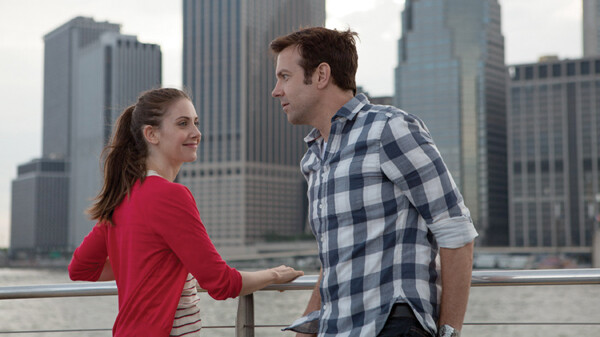Sundance 2015
Ten100(ish) Word Reviews
Cole Amundson | Tuesday Mar. 3rd, 2015
Between the corporate hangouts, fur coats, and perpetual parade of people peering into their pocket-sized screens, one might forget that The Sundance Film Festival is, well, exactly that. But once a year this “Big Sky On Crack Cocaine” resort town reconfigures its libraries, schools and churches to host filmmakers and film-lovers from across the world. I was lucky enough to catch a ride down with some friends and spend a weekend there. Between clawing my way onto wait-lists, and inhaling coffee, I managed to catch ten diverse movies. But were they any good? Since I have limited space, we’ll keep the reviews concise, and in the order in which I saw them. Most of them will be released later in the year.
Eden
Directed by Mia Hansen-Løve. Eden tells the story of Paul, a French DJ, and a twenty year sized slice of life as he navigates the burgeoning world of French house music. Along with a community of fellow music lovers, his world is rocked by turbulent moments like suicide, drug addiction, rocky relationships, missed opportunities, and a poor sense of personal finance. But the film handles these aspects with minimal melodrama and good humor. Though the only steadfast artists to emerge from this French subculture are Daft Punk (who the film juxtaposes with Paul’s own experience), Eden successfully captures the beautiful details of a certain time and place, even if that time was a single night on the dance floor.
The Bronze
Directed by Bryan Buckley. The last film that opened Sundance (Whiplash) also happened to be the top winner of the festival, and has gone on to be nominated for five Oscars. So one can only imagine the disappointment of seeing something like The Bronze open this year’s competition. It’s a comedy, apparently, about a mean-spirited gymnast who wins a bronze medal in the 2004 Olympics, despite injuring herself. Ten years later she spends her time slumming in her midwest hometown, basking in the afterglow of her short-lived fame until the promise of an inheritance compels her to train a young, aspiring Olympian. Several uninteresting, undeveloped situations ensue and the only relief from the tedious gross-out humor (Which can be done well. See: Bridesmaids and Neighbors) is a sex scene whose insanity equals the puppet sex from Team America: World Police.
The Black Panthers: Vanguard of the Revolution
Directed by Stanley Nelson. Speaking generally, it seems that our understanding of the Black Panther Party is limited to broad, absurd caricatures like those out of Forrest Gump (to be fair, Forrest Gump makes everything that isn’t like good ol’ boy ‘Murican values seem absurd). Of course, anything deprived of context can seem absurd. Which is why documentaries like this are important, to give context to a seemingly distant past. The beliefs of black nationalists don’t seem so crazy when you see footage of police brutality from that time. What I hadn’t known about The Black Panthers was how focused on community outreach they were, and that for many of them, it was about class as much as race. The documentary details the ups and downs of the movement, but one story that stuck with me was about Fred Hampton, a Black Panther leader who attempted to cross racial boundaries and organize the underclass around the nation. He was then murdered by the Chicago PD and FBI.
The End of the Tour
Directed by James Ponsoldt. Comedians face an uphill battle when acting in “serious” roles. They fight against preconceived notions and accusations of “trying to be taken seriously.” Yet time and time again history has given us comic actors like Jim Carey, Whoopi Goldberg, and Bill Murray who prove that good acting transcends genres. Which is why it should be no surprise that Jason Segel completely disappears into the role of David Foster Wallace in The End of the Tour, a film about a series of conversations between a Rolling Stone reporter (Jesse Eisenberg) and the famous author. It’s a film with great reverence for its subject, but one that doesn’t gloss over his flawed humanity. It’s also the best film I saw at the festival.
Reversal
Directed by José Manuel Cravioto. Kidnapped and trapped in a creepy basement, a young girl escapes, only to learn that her kidnapper has other girls trapped in other seedy prisons around the city. Faced with the choice between immediate escape and saving the other girls, she chooses the latter, but only by forcing her kidnapper to help. Though inspired by female revenge films of the seventies, the film honorably refuses to indulge in the disturbing sexual gaze of those movies. Reversal, however, fails to work in any other way. Whenever fights do occur, the editor doesn’t allow punches or stabbings to connect, making every fight feel flat and uninteresting. Throw in some incomprehensible flashbacks, and by the time the Q&A rolled around I was left with more questions about what happened in the story than anything else. It’s is a poorly edited film which despite advertising itself as a horror-revenge flick, fails to inspire anything resembling a chill in the spine.

Sleeping With Other People
Directed by Leslye Headland. Romantic comedies rely on contrivances to keep their lovebirds apart. In times past it was race or class, ideas imposed on the characters by society, but as time marched on it morphed into personal reasons, like characters not wanting to ruin friendships, or not wanting to get attached to a one-night-stand. In Sleeping With Other People, writer/director Leslye Headland takes one of the more original spins this declining genre has seen in sometime, by making actual sex what separates the two characters. Alison Brie and Jason Sudeikis play two charismatic, wealthy sex addicts who can’t be involved because how sex operates as a destructive force in their lives. It invites comparisons to the charm of When Harry Met Sally and the crude hilarity of Knocked-Up. A breath of fresh air in this otherwise stale genre.
Cronies
Directed by Michael Larnell. Cronies takes place in St. Louis and follows the shenanigans of three friends, two of whom are black, while the other is white. Shot in black and white, it has an energy, quirkiness, and strength of feeling rarely found in debut films. Though produced by Spike Lee, the film seems to shrug off the things that divide and cause conflict between races in America. Obviously race has always been a hot, divisive issue, especially in St. Louis, but it’s refreshing to see a film that has more optimism about how young people view such things.
99 Homes
Directed by Ramin Bahrani. Turning the Great Recession and foreclosure crisis into a gripping thriller, 99 Homes stars Andrew Garfield as an out of work construction worker who turns to working for a corrupt realtor (Michael Shannon) as a means of getting his house back. The film is fast paced and visceral, becoming downright disturbing as Garfield’s character begins evicting families and the elderly from their homes. The film is dedicated to Roger Ebert, who was a champion of Bahraini’s films, and for a good reason. Ebert was a critic, free of patronization, who wrote with great clarity. Like Ebert’s writing, 99 Homes expresses a specific vision (a moral vision in this case) with great clarity and insight. There is no mistaking what this film is trying to say.
The Tribe
Directed by Miroslav Slaboshpitsky. Look, it’s Ukrainian, it’s done entirely in sign language with no subtitles, no music, entire scenes are filmed mostly with one long take, and it’s unrelentingly dark and gruesome to watch. In other words, it couldn’t be any more different than the average American film. Yet to those willing to give it a shot, they’ll find one of the most engaging films of the last year. It reaffirms that the best cinematic storytelling is visual in nature. However, don’t bring a date with.
The Chinese Mayor
Directed by Zhou Hao. The last film we saw was a modest documentary about a man with big ideas. Mayor Geng Tanbo wants to reconstruct the city of Datong as a cultural haven equal to Rome or Paris. Of the changes he implements the most radical is the construction of a massive wall around the center of the city, dislocating half a million people. The documentary explores the effect of this on the average person in Datong, the battles bureaucrats have to take on to implement change, and the cost of change versus what it’s worth.
| Tweet |
